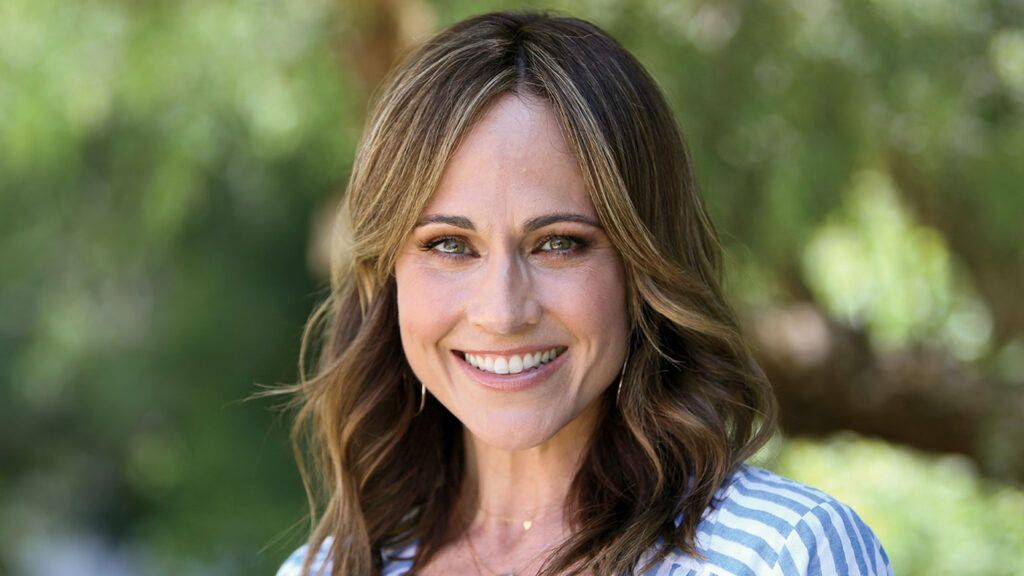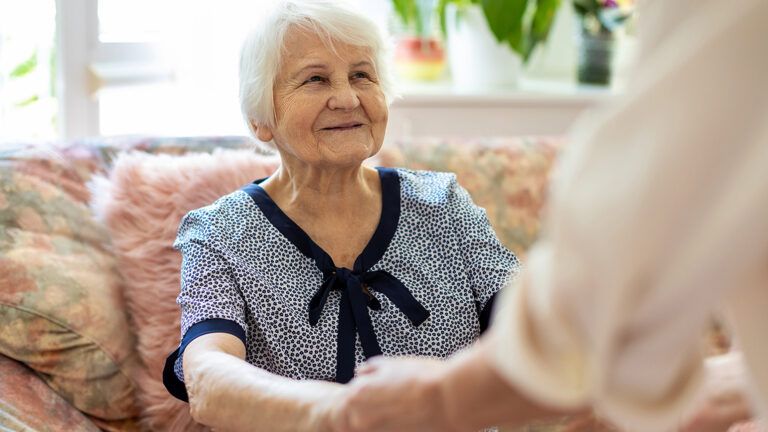Q. You grew up in Blackshear, Georgia, population: 3,500. How did your upbringing shape your faith?
A. I was really free-range—that’s the beauty of growing up in a teeny, teeny town. I loved church, Bible study and church camp in the summer. That’s where I first started performing. When I was three years old, I remember sitting in Sunday school and feeling I was wrapped in this blanket of light and warmth and love. I never really knew what that was until I felt it as an adult and was like, “That’s the presence of God!”
Q. Tell us about your dad.
A. My dad worked in our family’s timber and trucking business. He was a logger and drove 18-wheelers. He worked six days a week, got up at five in the morning to work, then came back home to take my sister and me to school. He was my basketball coach and drove me to voice lessons. He always made time for my brother, sister and me. Now you might be sitting outside the school for 30 minutes, and he might come swinging in on two wheels, but he always showed up. I could not have asked for a better father.
Q. In 2017, your newborn son needed heart surgery. Then, the same week, your dad was diagnosed with dementia at age 62?
A. Bennett had only one coronary artery, and it was in the wrong place. At five days old, he had major surgery. Five days later, I got a call from my mother about Dad. I had been trying to get my mom to get him checked out. He kept forgetting things and didn’t seem like himself.
At first I didn’t even think it was Alzheimer’s or dementia because he was so young. But Dad was diagnosed with a rare and aggressive form of dementia called Pick’s disease (commonly referred to as frontotemporal dementia). It affects the brain’s frontal or temporal lobes. Luckily we have the Alzheimer’s Association doing research, people dedicating their lives to finding answers on treating it and slowing its progression.
Q. What did it feel like to get this news all at once?
A. The best way I can describe it: The life you once had, the life you once knew, it’s all gone. I had to figure out a way to exist inside this new reality. Part of my heartbreak was that I was 2,500 miles away, in California. Bennett was in the hospital for a month after his surgery. He came home on oxygen. He was super compromised. We couldn’t have people visit, and no one could hold him.
I couldn’t get to my dad because I had to keep my son alive. To not be able to get to this man—who had spent his life protecting me, taking care of me and being my biggest advocate—was excruciating.
Q. What changes did you see in your dad’s personality leading up to the diagnosis?
A. The year my older son, Hudson, was born, my dad forgot my birthday. He was always the first person to call on my birthday. My family visited after Hudson arrived. Dad loved kids. His grandkids were obsessed with him. He was the one who got up in the middle of the night to give us kids our bottles. But he was just not interested in my baby. He held him for a minute, said “okay” and handed him off.
He was disconnected emotionally—so unlike him. He lost his temper a lot, got frustrated and was disengaged from people. “He’s just unhappy with work right now,” my mom said. I thought maybe he was going through a midlife crisis. But the strange behaviors became even more strange.
Q. Did your dad know something was wrong with him?
A. I buy my mother’s Christmas gifts—I know what she likes—and Dad would give me the money for them. I landed in Georgia, and he said, “How much do I owe you?” He wrote out a check. Later that night, he came back with his checkbook. “Hey, I want to pay you for your mom’s stuff,” he said. “Dad, you already gave me a check,” I reminded him. The next day, he asked again. Same thing the next day.
I sat him down. “Dad, are you okay?” He said, “I just know something’s wrong, but I can’t put things together.” My dad was not a crier, but he put his head down and tears started down his face. I put my arms around him. “You know what, Dad? You may have to see some doctors, but we’ll figure out what’s going on.” Months later, Dad went to the Mayo Clinic. That’s when we got the diagnosis.
Q. How heartbreaking. What got you through those days with your son’s heart problem and your dad’s diagnosis?
A. My faith is my everything. Sometimes there’s this idea that if you just pray hard enough, or if you live a perfect life and do exactly what God expects of you, then bad stuff is not going to happen. Bennett was five days old when he had his first surgery. There’s nothing he did to deserve or cause it. The truth is, that’s life. Devastating, heartbreaking things happen.
What helps you move through them is faith. What helped me find every single miracle and every single piece of magic inside those really hard times is my faith. I don’t know how I would’ve gotten through these past three years, and I certainly don’t know what kind of person I would’ve been on the other side, if I didn’t have God and Jesus in my life.
Q. How does prayer help you?
A. I pray every single morning; it’s the first thing I do. And it’s the last thing I do before I go to bed. I pray over everything. I was praying, “Lead us to the right doctors, lead us to those we need and those who need us.” And for my dad to be, in every single step, protected. The Alzheimer’s Association, at every turn, has been so helpful.
We went through a hard moment where we thought we were going to lose my dad. My first call was to the Alzheimer’s Association. They helped us find a great doctor ASAP. I pray to have the courage to ask for help, the openness to see what I’m not seeing and to walk through a tough situation with an open heart so that I can be there for my mother and for my dad. We can be reminded every day of our job as human beings, which is we are all here walking each other home.
Q. How did you and your family care for your dad?
A. At first it was manageable, figuring out, Why is he hiding boxes of Pop-Tarts in his car? It progressed to “We’ve got to get anything that can be used as a weapon out of the house.” You go through different stages.
I flew home whenever I could. A lot of times, we were dealing with big things. I thought, I’ll be the bad guy and take away the keys to his truck. He can show up at my brother’s or sister’s and ask, “Where are the keys?” But if I say I took the keys to California, he can’t get to California. It made sense for me to be the bad guy in those situations.
Q. What’s your advice to caregivers who find themselves in a constant state of worry?
A. When you’re in a stressful, scary situation, the way to move through it is to tell yourself, “All right, I’m going to get through this next minute. Then, after that minute, I’m going to get through the next minute.” Those minutes become hours, days, weeks, months. I had to learn how to do this with Bennett. Being at a hospital, asking, “What’s going to happen?” “Is he going to make it?” “Am I going to be able to bring him home?” All of those questions do a number on us.
I have shared this with people during the Covid pandemic: “Let’s not focus on what’s going to happen in six months.” This allows you to find the moments of joy and happiness and a little bit of laughter. We need that.
Q. How is your dad doing now?
A. Last year, we moved Dad into a facility. These are hard conversations that families have to have. We always said to my mother, “When you cannot do this anymore, wave the white flag. Then we will do whatever is necessary to save you.” She waved the white flag. She’d been up all day and night for nine days straight. Dad wasn’t sleeping, so she couldn’t sleep. He was a danger to himself.
With Pick’s, your brain does weird things and disconnects in a very specific way. You can pick up an iron and think it’s a knife. He was up all night pacing and outside with a flashlight, thinking people were coming after him. He was setting off the alarm all night long. We did what a lot of families have to do—we had to save the caregiver.
Q. How do you connect with your dad these days?
A. We FaceTime a lot. There’s an incredible woman at the facility he’s in. Her name is Des. Shout-out to Des! She is in charge of all the activities. She is an angel. She takes such great care in making sure that my dad is okay and happy. I FaceTime through her and get to see him. Every time he sees me [on FaceTime], he says, “Hey, Nik.” He still remembers my name. That’s a miracle.
For more inspiring stories, subscribe to Guideposts magazine.





